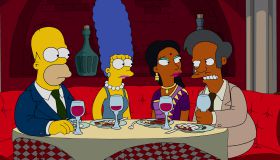The Simpsons’ and ‘Silicon Valley’ and when TV showrunners avoid creative challenges

May 16, 2018
It's always surprising when you hear people behind successful TV shows confess they're out of ideas. I was thinking about this when the creators of HBO's "Silicon Valley" sheepishly admitted that issues of sexism and harassment in the tech world won't be incorporated into the show this season. "We certainly aren't like, 'Oh, let's not talk about that,'" showrunner Alec Berg told The Hollywood Reporter last month. "We talk about it all the time. The lack of hitting it head-on just comes down to the fact that we haven't done a great job of finding the definitive satirical take on it." That's quite a bar they've set for themselves. I'm not sure even the show's most ardent fans expect a definitive satirical take on any subject, but you can see how this kind of framing lets the creators off the hook. Creative paralysis isn't something you usually see TV writers cop to, but something similar is happening on "The Simpsons." This past week, in an episode titled "No Good Read Goes Unpunished," the show responded to long-standing criticism concerning stereotypes and the character of Apu. Hoping to share a novel she loved as a child with daughter Lisa, Marge realizes, with hindsight, that it is full of racist tropes. When she edits out the offending portions, Lisa isn't sold: "Kind of means there's no point to the book." And then she offers this glum and strangely out-of-character assessment: "Something that started decades ago and was applauded and inoffensive is now politically incorrect. What can you do?" The scene's veiled reference becomes all the more pointed when Lisa turns to gaze at a photo of Apu on her nightstand. What can you do? She's not really asking. It's a rhetorical question. That sound you hear is a show hitting a creative brick wall and openly admitting to it. No embarrassment, just laying it out there: We're stumped. I would argue the writers are selling themselves short. When audiences point out that a TV series perpetuates ugly stereotypes _ or in the case of "Silicon Valley," ignores an entire swath of the population _ it presents all kinds of opportunities for showrunners to reconsider their approach. There are other TV series that have faced this kind of fork in the road, but "Silicon Valley" and "The Simpsons" are the most recent. And instead of rising to the challenge, both shows have chosen to admit defeat and punt. I can't get over how weird it is to see comedy writers just own up to a lack of imagination. Are they really so creatively spent? So exasperated and stymied by the elephant in the room? Maybe these are the inevitable limitations of writing staffs that are predominantly straight, white and male. "Silicon Valley" is currently in its fifth season. It's unclear how long the show will run, but there's the distinct possibility that it could end before the writers get around to finding a "definitive satirical take" on some of these issues. "The Simpsons" by any measure is a marvel of longevity _ next year will be its 30th season _ and perhaps internally, just the idea of keeping Apu around has become too entrenched for its writers to risk otherwise. Mallika Padma Rao was one of the first people to write about criticisms of the show's Kwik-E-Mart proprietor. In a 2013 piece for the Huffington Post that asked "Is It Time to Retire Apu?" she points out that the character has long been "the bane of young Indian Americans' experience." "There is a huge power imbalance when you're stereotyping Indian people who are really only now starting to have cultural power in America" Rao said when I reached her by phone. "The criticism of Apu is about this being the sole representation for so long _ and the effect that had. I think that's something the show was not aware of at the time." The show can't claim ignorance now. One of the people Rao spotlighted in her original piece was comedian Hari Kondabolu, who is both a fan of "The Simpsons" and also one of its most visible critics. He outlined his conflicted feelings about the show in his documentary "The Problem with Apu." The film first aired last fall on truTV and it will be rebroadcast on the cable network again Sunday. (Check local listings. It is also available on iTunes). Kondabolu has declined to speak to journalists in the wake of "No Good Read Goes Unpunished." He was in Chicago for a podcast taping Tuesday, and while "The Simpsons" was left undiscussed, he did tweet his disappointment with the episode when it aired: "I used Apu & 'The Simpsons' as an entry point into a larger conversation about the representation of marginalized groups & why this is important. 'The Simpsons' response tonight is not a jab at me, but at what many of us consider progress." The documentary includes an interview with Dana Gould, who wrote for several years on the show, and the exchange is ... interesting. Gould asks Kondabolu if he can "bust" him on something and then asks if he thinks other characters on the show, like Mr. Burns, are also one-dimensional. Yes, Kondabolu replies. But Mr. Burns is a megalomaniac with power and "The Simpsons" has always made fun of people in power. Apu is not in a position of power. "To the writers," Gould says, "there's no difference. Mr. Burns is funny in these four ways, and Apu is funny in these four ways." It's fascinating to hear a writer describe such arbitrary limitations, but they're clearly there _ and they're clearly self-imposed. "What's so provocative about this latest episode of the show," said Rao, "is that the argument has already been made about Apu. So now the question is, why are they so resistant to thinking about that? Forget agreeing with it. They're not even entering the conversation. My feeling is that because 'The Simpsons' has been around forever, it's become resistant to change. But change is part of being a creative person." I think that's right. And it's what makes this kind of resistance feel so beleaguered but also deliberate. You can't write for television without solving problems. Shows adapt to changing circumstances all the time. "There's a larger conversation too about, liberal or conservative, I do think white men feel their relevance is threatened right now," Rao said. "And honestly, I get it. I think that's got to be a tough position to be in. America has changed pretty rapidly in the last 20 years in terms of cultural dynamics. I was born in the '80s and my generation of Indians has come of age and we have a voice now. That's a big shift that can be hard to wrap your head around if you're a white kid from New Jersey who went to Harvard and then got a job on 'The Simpsons.'" More broadly: Yes, it's better not to address a topic at all than to do it badly. That's clearly "Silicon Valley's" approach. But why are those the only two options? It feels like an abdication of a writer's creative duty. "But I don't think they see it as a duty," said Rao. "They probably have directives from network executives and there are ratings issues. I'm not in the business of telling people who to care about, but I feel like it's very easy for them to sort of write off the consequences of what they're doing because they're not directly affected. People who have benefited from the system _ even if they're aware of the imbalance _ it's really hard to step outside of that and say, 'What's my larger duty here?' They don't have the imagination, apparently, to think about other people." There's a larger point to be made about the power of images and the way they burrow into our collective subconscious. Blacklist founder Franklin Leonard talks about this in an essay for Vanity Fair this week. He notes only recently discovering that Frederick Douglass was the most photographed American of the 19th century: "This was no accident. According to Harvard professor Sarah Lewis, Douglass believed deeply in the power of photographs to define the reality outside their frames." Moving images have a similar power. Franklin draws a line between the Douglass era and our own, focusing on the ways TV and film can also shape our views, for good or for ill: "If you can see it _ in life or in fiction _ you can be it," he writes. "Less is made of its corollary: If you see it enough, it's going to affect how you see the world." TV shows are built to entertain but they don't exist in a vacuum. They tell us something about what _ and who _ we value. That doesn't mean every portrayal should be idealized. But it's worth considering why certain shows are so wedded to stereotypes _ or just uncomfortable grappling with change. When the status quo is challenged, people tend to get their back up. That's OK. Ultimately I think these conversations are having an effect. This week HBO programming head Casey Bloys told The Hollywood Reporter he has been working to ensure gender parity behind the camera, with the ratio of female to male writers and directors "working its way to 50 percent." And as for actors and the wage gap: "We've proactively gone through all of our shows," Bloys said, "in fact, we just finished our process where we went through and made sure that there were no inappropriate disparities in pay; and where there were, if we found any, we corrected it going forward. And that's is a direct result of the Time's Up movement." What can you do, Lisa Simpson asked? The answers are there. Hollywood just needs to rise to the challenge. ___ (c)2018 Chicago Tribune Visit the Chicago Tribune at www.chicagotribune.com Distributed by Tribune Content Agency, LLC.







